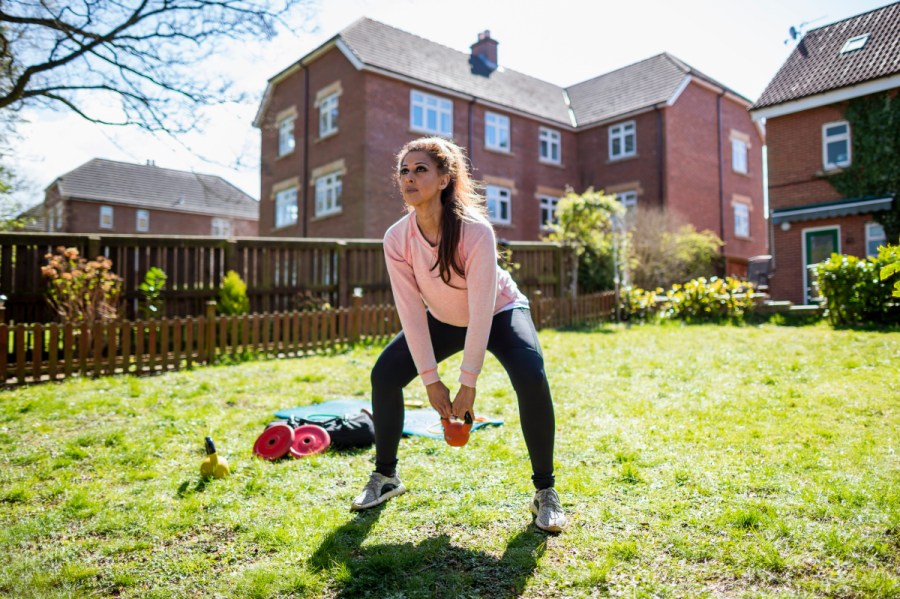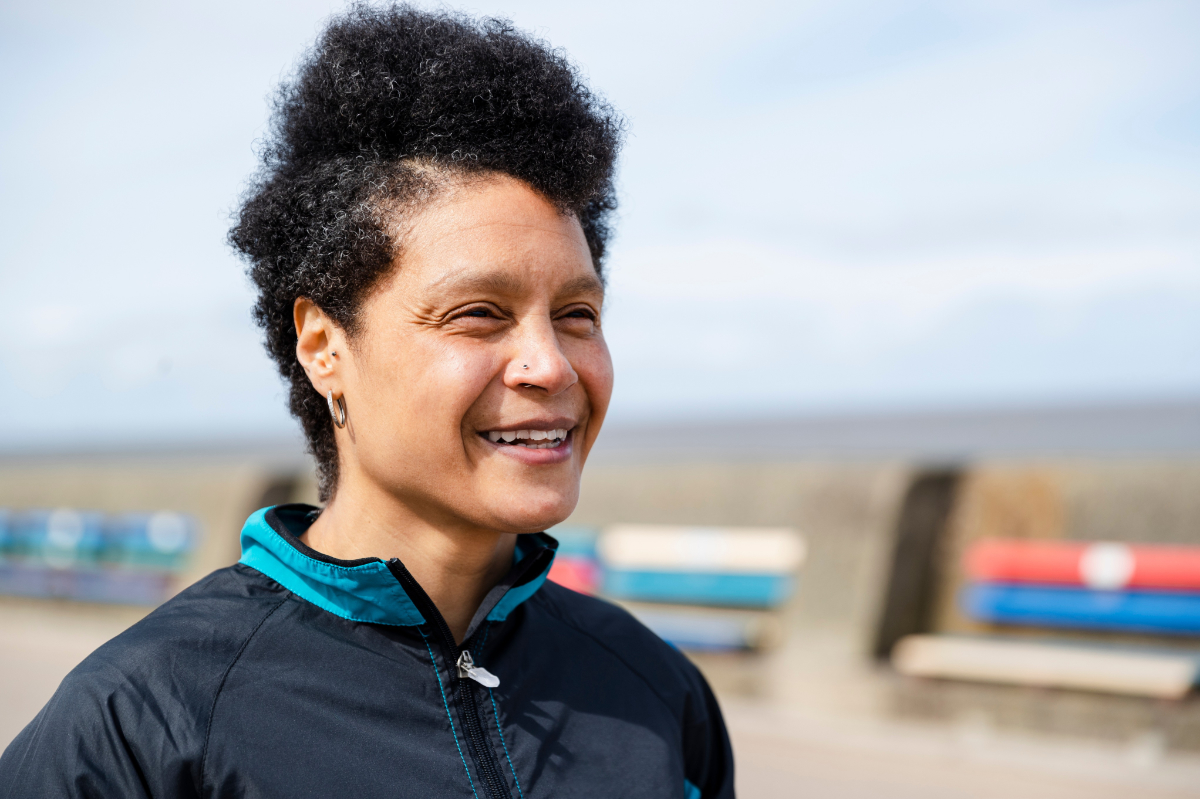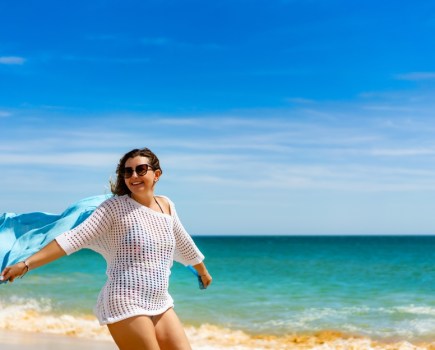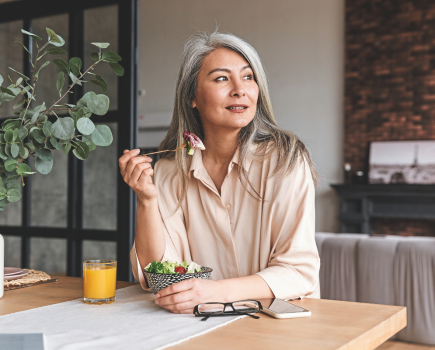Staying active during menopause is an important way to feel better during this period of life. Now Women in Sport (womeninsport.org) is raising the profile of sport and activity for menopausal women.
The organisation has launched new research on the subject of menopause and is calling for action to make sure women in midlife get the chance to enjoy sport and activity. It wants to inspire women with new perceptions of what ‘being sporty’ is. It is calling for more promotion of sport and exercise for menopausal women by health professionals. Here are some of the stories the organisation has put together to show women leading wonderfully active lives. You can also watch a short film about them on YouTube.
Nina, 48, from The Wirral
‘I believe sport helped me through my journey of being menopausal’
Whether she is out running, playing badminton or learning how to do a front somersault for fun, Nina has always loved sport and knows how essential it is to her physical and mental wellbeing. She has shared the science and research of the benefits over many years as a lecturer and now works for a health and wellbeing company.
“As a black woman I am at higher risk of various conditions like type 2 diabetes, sarcopenia and others. I was confirmed by a blood test around age 43 to be perimenopausal. I have a blood condition, so I booked a doctor’s appointment to talk about that and the GP said by the way you are perimenopausal.
“I liken it to a snow globe – it shook that globe. I wasn’t given a leaflet, there was no conversation. I was shell-shocked when the snow in the globe began to settle, I just thought what is it? I’m researching and then beginning to piece little parts of my jigsaw puzzle together.
‘The images popping up were white women… the images didn’t resonate with me’
“I was researching menopause and the images coming popping up were white women. There were so many platforms to provide the support and education but on a personal level, the images didn’t resonate with me.
“When you are asking about different bodily differences, my hair for example, my Fraggle Rock hair – what can I do about it? Or my polka dot dry eczema on my lower limbs you could sense discomfort that they weren’t able to have that culturally competent conversation.
“It made me realise that the black community doesn’t talk about it as much as we should, and we need to. We all need to consider the potential benefits of moving more and the relationship it can have on menopausal symptoms as well as reducing the risk of chronic diseases.
‘I want longevity… I will do anything to support my health’
“I want to be fit and healthy to enjoy the things as my son goes through his life… Menopause made me think I need to keep going, be active, be healthy, be strong and fit. So if my son says can we go and do this I am not a watcher – the fact that he is asking I want to be involved.
“I want longevity to be able to chase that 9-year-old around the field and I want to be on the taekwondo journey with him, we do it together. I will do anything to support my health.
“It is lifestyle, diet, activity, mental health, socioeconomic status, they all play a role in someone’s menopause journey. I do believe sport has helped me through my journey of being a postmenopausal woman.
“We collectively need to dismantle the existing menopause stigma and taboos that are unhelpful and let ‘all’ women know that it’s ok to talk about it and provide education.”
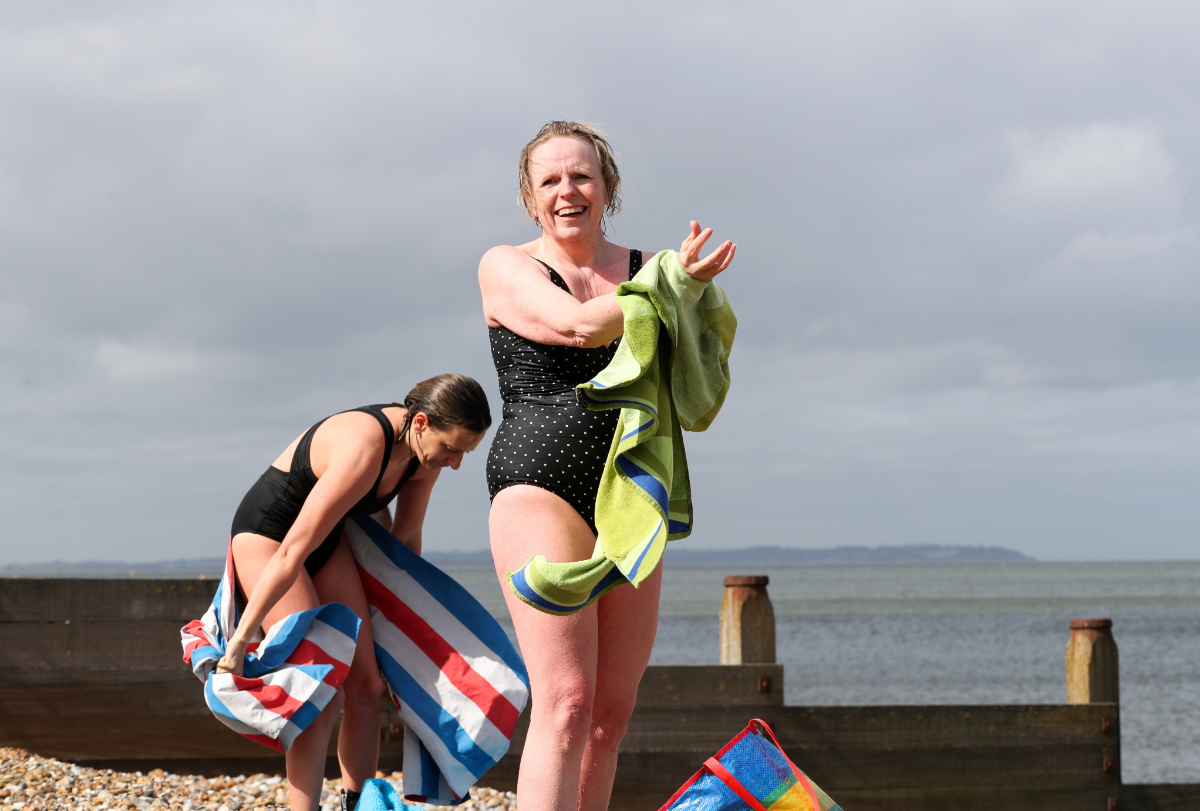
Catherine, 51, from Kent
‘Cold water swimming has helped me deal with this change in my life’
At least twice a week Catherine puts on a woolly hat, swimming costume and special gloves that were a gift from her kids and walks into the freezing waters of the North Kent Coast near Whitstable. She has taken up cold water swimming with a group of like-minded supportive women who call themselves ‘Getsalty Whitstable.’
Yet just two years earlier Catherine didn’t even get into the warm, inviting sea in Australia during a family holiday to celebrate her 50th birthday. Looking back at photos after the trip, Catherine didn’t like what she saw and says alarm bells went off in her mind. They were evidence of her staying on the beach, covering up her body whilst her two children played in the water. Catherine says that the holiday memories and starting to feel that her body was altering in ways that she couldn’t control, spurred her into making some changes.
‘I thought “why should I be stuck with it?”‘
“I remember talking to my sister and saying I’ve got a belly. My sister sympathetically said it is the menopause, you can’t do anything about it now, you are stuck with it. When she went home I thought ‘why should I be stuck with it’?
“These were my first menopause symptoms where I started to gain weight and couldn’t shift it so easily. Then I started a few other minor symptoms. It’s like the wheel of fortune thing, someone spinning that daily and seeing what lovely symptom will you get today, Will you sweat all night, will your skin itch, will you wake up, will you put on weight – and you think no I don’t want all this.
“I thought I need to get healthier and get fitter because my body is changing, there is nothing I can do about that but I want to try to keep up with it and deal with these changes better.
‘I finally went for my first swim’
“At the same time as I was having menopausal symptoms, Louisa who set up ‘Getsalty’ in Whitstable, she had started to do the cold water swimming last year in Jan 2020. I was working with her once a week and she would come in and tell me about all these amazing swims she had had. So I finally went for my first swim.
“The great thing about this group is there is no pressure whatsoever. No one will make you do what you don’t want to do, there is no competition, nothing.
“Also, the camaraderie and what we get from each other is great. I appreciate every single woman in that group for a different reason. We all have a common bond of getting in cold water.
‘Don’t accept what you are told about the menopause’
“Some days your brain goes running in, other times you are thinking I don’t want to get in. Some days there is sea froth and you have to time your entry into the sea to not get knocked off your feet.
“Don’t accept what you are told about the menopause. I was told I would always have a belly and that I would get these symptoms and I would just have to deal with it. There are other ways.
“For me, I know that the act of cold water swimming has helped me deal with this change in my life. I feel like I am back in control and I feel comfortable with who I am.”
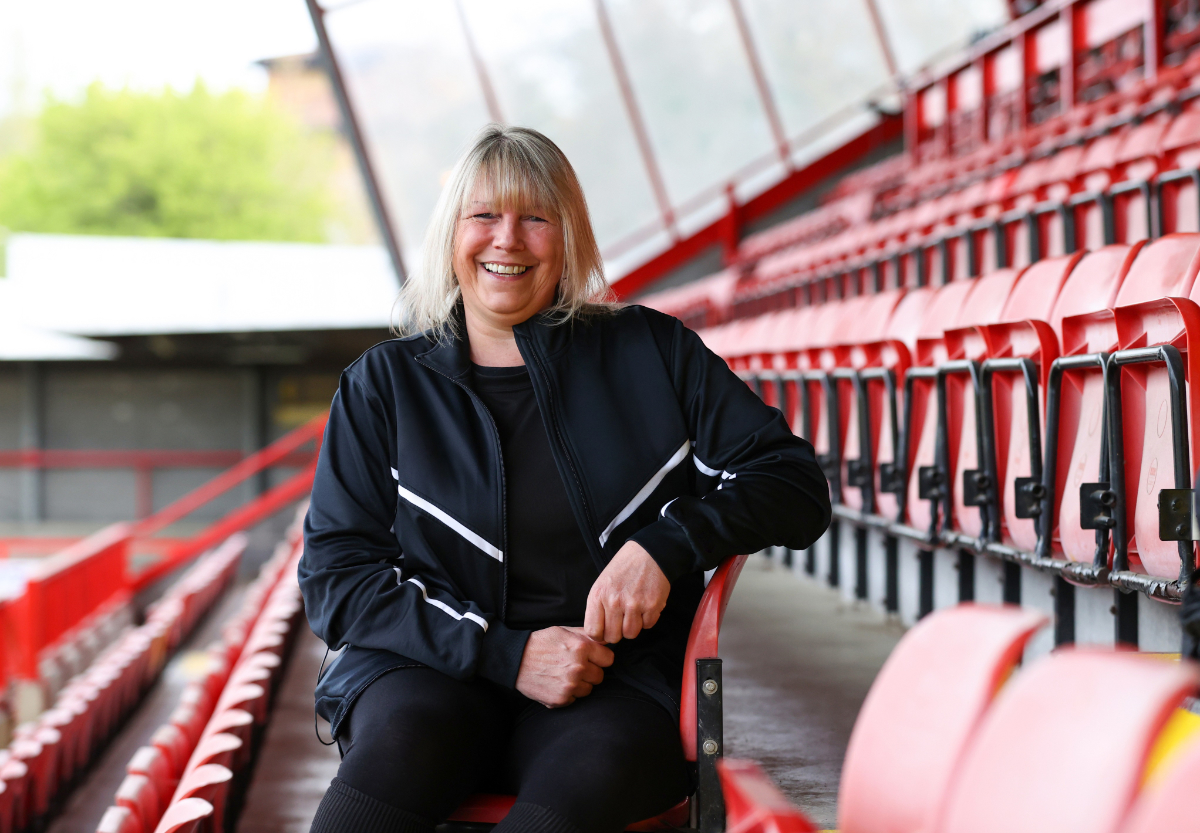
Carol, 54, from West Sussex
‘I want menopausal women to know normal people like us can be active, and it helps’
Carol loves the game of football. When she walks off the pitch each week she is smiling, red-faced and sweaty from running around. She took up the game playing socially for the first time in her late forties and over the past few years it has brought great joy to her life and made Carol feel stronger and fitter.
“Throughout the years I have loved football and always been involved somehow but never got the chance to play until I reached my late forties. Football for women was banned by the FA for 50 years till 1971 so women like me never got the chance to play football.
“We are part of the missed generation. When I was 48 a friend asked me to play in a charity tournament for a local team. It was so much fun I completely loved it.
“The Community Foundation that works with the club was running sessions for girls. It had a project encouraging girls to play and I saw a tweet and thought I would love a kick-about. I asked the age group and they said it was 14 – 25. I was nearly double the age. I thought I really want to play now, so I said what if I get a few women together can we do something like that for older women.”
‘I am just not that kind of person to do yoga or fitness classes’
“I hadn’t been active for years, I am just not that kind of person to do yoga or fitness classes. I could not run to the bottom of the road without half dying but over the years now I can do that ten times without even realising it. It is so important as well when women are coming up to the menopause. We need to increase bone density, stave off diseases, and things like that so it is so important that women are active.
“I think talking about the menopause is massively important, there is not enough out there on the subject. I am passionate about getting more imagery out there of women like me – I see pictures and I don’t identify with any of those women. I want to see real women with rolls of fat, smiling, laughing. Especially women of my age I need to see that to know that I can do that.
“You get your own identity back. We are all so engrossed with everything, in being mum and family. We are there doing everyday things.
‘I have seen the growth and confidence in women’
“But many of the women joining in are saying this is my time now, it is my time to be active and play football. The confidence that gives women with their self-esteem is brilliant. We all know the mental and physical health benefits. I see women when they come in and don’t know anyone and I have seen the growth and confidence in women, they are smiling and they love it.
“I want to reach all these women who are going through menopause, which is so important that you are active anyway and I want them to know that normal people like us can be active and it helps.”
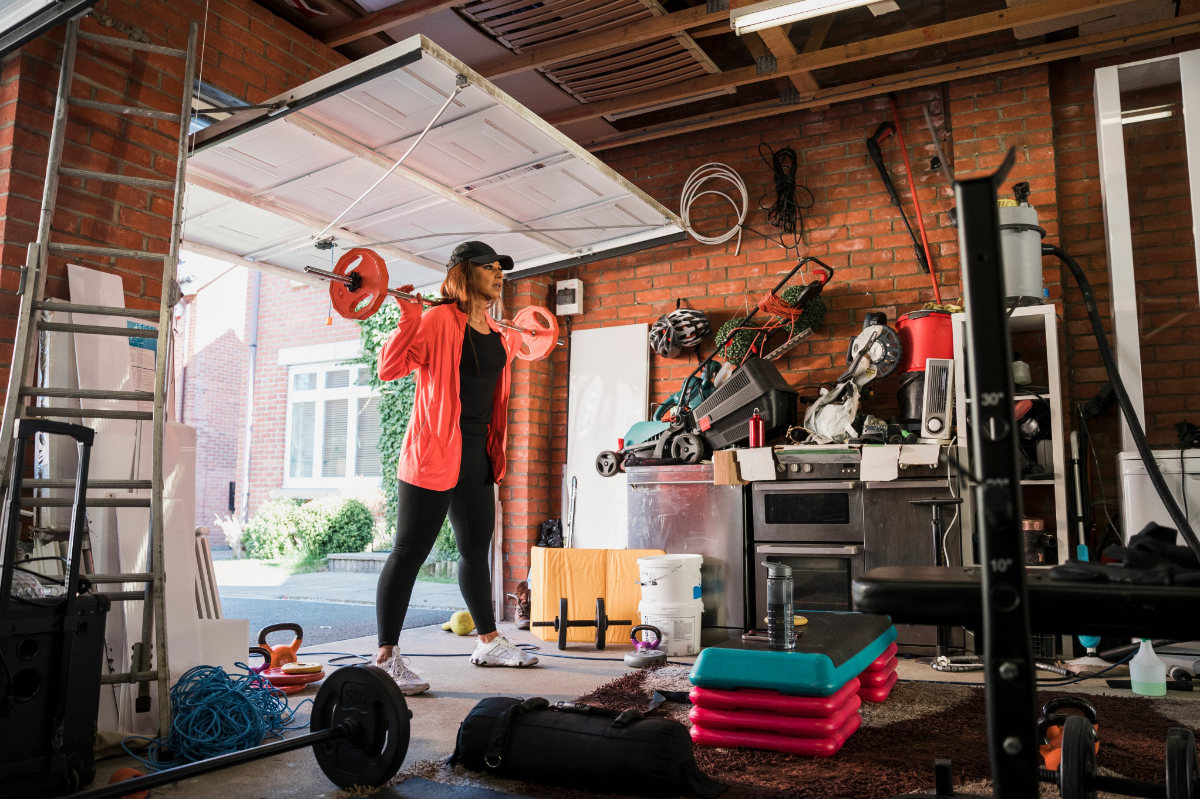
Shazia, 45, from Middlesbrough
If you are fitter and healthier everything is going to be a little bit easier for you to manage.
Shazia trained in fitness and counselling and then set up a not-for-profit fitness company to benefit the women in her area. Predominantly populated by South Asian women and their families in Middlesbrough Nur Fitness helps to deal with key issues such as menopause, mental health and cancer that today are still taboo subjects for BME communities and through exercise help them live healthier, happier and more empowered lives.
“I think a lack of understanding about the menopause is a generational problem. I don’t think a lot of women understand that in our community or the men and I think a lot of people probably suffer more because of that. Can you imagine the impact that has on you when no one understands what you are going through?
“There are too many people out there who are suffering and a lot of that is due to a lack of awareness, so we think it is our duty to make a difference really.”
‘If it is someone near your age, from your background and culture… it becomes more acceptable’
“Sport isn’t even seen as important part of our culture’s lives. All of our instructors we have purposely chosen women at different stages and places in life.
“Our sister is one of them, she is 55 so I get her to talk about it and tell them what you are going through, they might say oh that happened to me and that breaks down barriers. If it is someone near your age, from your background and culture and language all of a sudden it becomes more acceptable to them.
“That’s why I am taking part in this they need to see people similar to themselves it might help them to know it happens to all of us.
“If we had something like Nur fitness then for my mum, it might have helped her. A lot of women come to me depressed with no one to speak to, people laugh at them and think they are being dramatic. That is what she was like and the knock-on effect was we suffered. I don’t want that to go in vain. I want to use my experience to help other people.
‘Sport makes a big difference’
“If someone is struggling with their hormones etc during Ramadan we advise gentle exercise like a walk. But a funny thing is that if you are on your period you don’t have to fast. But when you are older and your periods have stopped post menopause you don’t get that break you have to go the whole time.
“If you don’t have a period, you have to fast. So older women used to having that break it absolutely kills them. They are exhausted. Plus they do more than the men, they are doing everything so that can really have an impact.
“Sport definitely helps them, it makes a big difference. Exercise makes you happier. If you are fitter and healthier everything is going to be a little bit easier for you to manage.”

